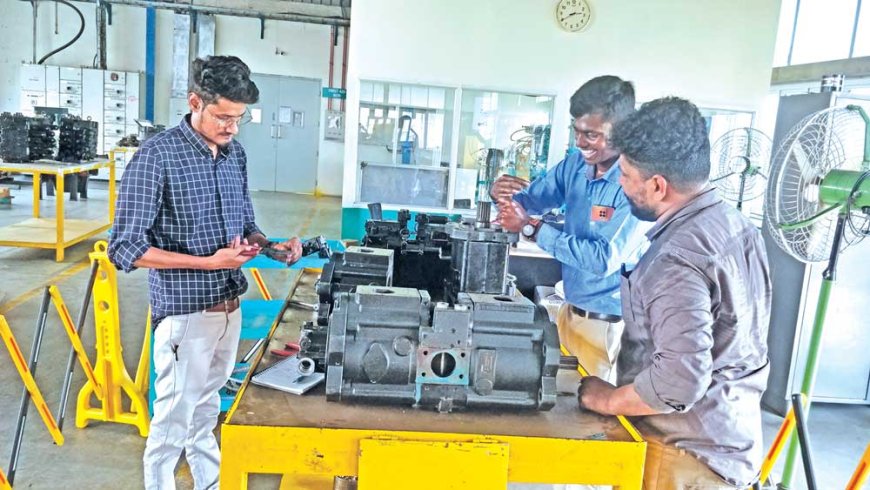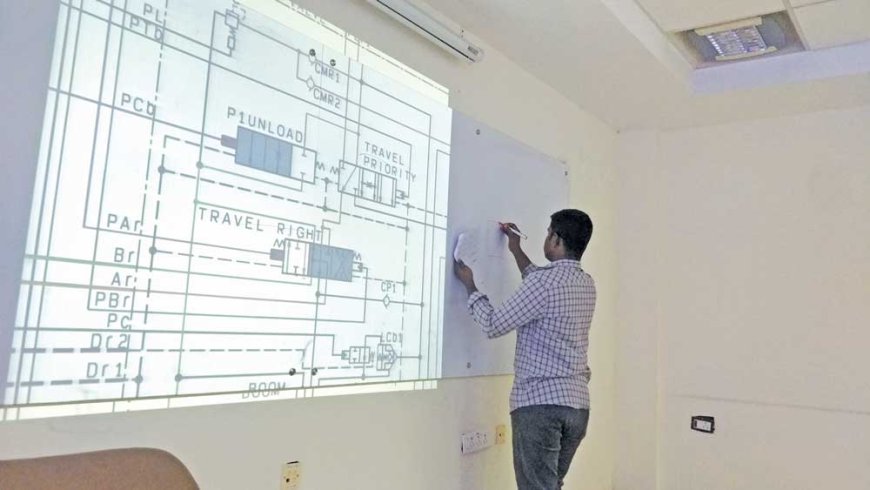Over the past decade, IESC has established itself as a cornerstone in cultivating skilled labour.

Moses Eddy
Director & Executive Vice President, Kobelco Construction Equipment India
How do you look at the 10-year journey of Infrastructure Equipment Skill Council (IESC) as an apex skilling body for construction equipment?
Over the past decade, the Infrastructure Equipment Skill Council (IESC) has established itself as a cornerstone in cultivating skilled labour for the construction equipment sector. Its journey epitomizes a narrative of transformation, characterized by innovation, collaboration, and adaptability. Through initiatives such as fostering industry-aligned training programs, advocating for technological progress, and bridging the academia-industry gap, IESC has propelled the development of a competent workforce in construction equipment operation and maintenance. Its decade-long path underscores resilience, agility in responding to industry shifts, and a steadfast dedication to enhancing employability and productivity. As a leading skilling authority, IESC shines as a catalyst for sustainable growth in the infrastructure sector.
How do you assess the current skill level of construction equipment operators in the industry?
Assessing the current skill level of construction equipment operators involves several factors. Firstly, examining operators’ certifications and qualifications provides insight into their training and proficiency. Secondly, evaluating operators’ capability to troubleshoot equipment problems and adapt to technological advancements yields valuable insights into their skill level. Ultimately, employing a holistic assessment method, which integrates observation, documentation, and feedback from stakeholders, ensures a comprehensive understanding of operators’ skill levels within the construction equipment sector. We primarily conduct trainings based on identified needs. Prior to commencement, our team engages with participants, managers, supervisors, and equipment owners to compile their specific requirements. We ensure all these needs are addressed comprehensively in both classroom and practical sessions. Pre-training assessments are conducted to gauge participants’ existing competencies, followed by post-training evaluations involving stakeholders. Feedback is gathered from participants, discussed at the training’s conclusion, and we maintain ongoing communication with supervisors and owners to continually assess training effectiveness. This approach ensures our training remains tailored and impactful for all involved parties.

What inspired your company to develop training and skilling initiatives for construction equipment operators?
Our company embarked on developing training and skilling initiatives for construction equipment operators, spurred by a deep-seated recognition of the critical necessity for proficient workforce development within the industry. The observation of a pronounced demand for skilled operators, coupled with the adverse effects of insufficient training on safety, productivity, and overall project efficiency, propelled us into action. Moreover, we comprehended the potential of our initiatives to bolster employability, uphold industry standards, and foster sustainable growth in the sector. Through the implementation of comprehensive training programs, our objective is to equip operators with the requisite skills and knowledge to excel in their roles, thereby benefiting both individuals and the construction industry at large.
Briefly outline the objectives and goals of your training programs for operators. Could you describe the structure and format of your training programs?
Our goal is to ensure that operators are well-versed in the maintenance procedures, safety protocols, and special features of our equipment, promoting longevity and optimal performance. Additionally, our training programs target the specific needs of customers who purchase our special attachments, providing tailored instruction on their operation and safety guidelines for various specialized applications. Overall, our goal is to empower operators with the expertise to execute their roles effectively, enhancing productivity and safety across diverse construction environments.

Our training programs are categorized into two segments based on specific needs. The first segment focuses on Standard excavator operator training, while the second addresses special attachment operator training. Standard operator training caters to both newcomers and seasoned operators, providing them with hands-on exposure to the latest “Kobelco Technology,” encompassing operational features, maintenance protocols, safety measures, and techniques for efficient and secure excavator operation. Special attachment training targets operators of our customers who are acquiring our special attachments for the first time, offering guidance on operation, best practices, and safety precautions specific to these attachments. These attachments serve specialized purposes such as canal preparation, building demolition, urban breaker usage, aquatic applications, and furnace/scrap handling.
What specific skills and competencies do these programs aim to develop in operators?
These programs are designed to cultivate a diverse array of specific skills and competencies among operators. Initially, operators will develop proficiency in operating excavators incorporating the latest “Kobelco Technology,” encompassing familiarity with machine controls, diverse operation modes, and optimization of performance. Moreover, they will enhance their capacity to conduct operations safely and efficiently, adhering rigorously to industry-standard safety protocols while effectively utilizing safety accessories. Furthermore, operators will acquire maintenance expertise aimed at ensuring the longevity and reliability of equipment. For participants engaged in special attachment training, competencies will encompass mastering attachment operation, comprehending attachment-specific guidelines, and adapting techniques for specialized applications such as canal preparation, demolition, and the handling of diverse materials. Ultimately, these programs aspire to nurture a holistic skill set in operators, enabling them to perform their roles with assurance and proficiency.

How important do you think certification is for construction equipment operators in today’s industry? How do you evaluate the effectiveness of your training programs?
Certification plays a pivotal role for construction equipment operators in the contemporary industry, serving as a validation of their expertise, knowledge, and adherence to safety protocols. It not only bolsters operators’ credibility but also amplifies their employability and potential for higher earnings. Employers often favor certified operators for their demonstrated proficiency and unwavering commitment to professional growth.
In evaluating the efficacy of our training programs, we adopt a comprehensive methodology. Initially, we conduct pre-training assessments to gauge participants’ existing proficiencies and knowledge levels. Throughout the training regimen, we meticulously monitor participants’ advancement via practical drills, simulations, and knowledge appraisals. Post-training assessments enable us to gauge the extent of skill acquisition and competency development.
Furthermore, we actively seek feedback from participants, instructors, and industry stakeholders to ascertain the training’s pertinence, engagement, and impact on job performance.
Through continual monitoring and analysis of these metrics, we ensure that our training initiatives remain effective, pertinent, and responsive to the evolving demands of the industry and its workforce.
How do you stay updated with industry trends and best practices in operator training?
We employ several strategies to stay abreast of industry trends and best practices in operator training. Firstly, we maintain active engagement with industry associations, participating in conferences, seminars, and workshops to network with peers and stay informed about the latest developments. Additionally, we collaborate with equipment manufacturers and technology suppliers to understand advancements in machinery and training methodologies. Continuous feedback from our trainers and trainees also provides valuable insights into evolving needs and challenges. Moreover, we conduct regular reviews of industry publications, research reports, and online forums to gather information on emerging trends and innovative training techniques. This multifaceted approach ensures that our training programs remain relevant, effective, and aligned with industry standards.








